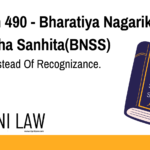Code: Section 99 BNS
Section 99
Whoever buys, hires or otherwise obtains possession of any child with intent that
such child shall at any age be employed or used for the purpose of prostitution or illicit
intercourse with any person or for any unlawful and immoral purpose, or knowing it to be
likely that such child will at any age be employed or used for any such purpose, shall be
punished with imprisonment of either description for a term which shall not be less than
seven years but which may extend to fourteen years, and shall also be liable to fine.
Explanation 1.—Any prostitute or any person keeping or managing a brothel, who
buys, hires or otherwise obtains possession of a female under the age of eighteen years
shall, until the contrary is proved, be presumed to have obtained possession of such female
with the intent that she shall be used for the purpose of prostitution.
Explanation 2.—“Illicit intercourse” has the same meaning as in section 98.
Explanation of Section 99 BNS
Section 99 of the Bharatiya Nyaya Sanhita (BNS) is a stringent provision aimed at preventing child trafficking for prostitution and other immoral activities. It criminalizes any act of buying, hiring, or obtaining a child for such purposes, imposing severe punishment to deter offenders.
Key Provisions:
- Scope of Offense:
- Covers acts of buying, hiring, or obtaining possession of a child.
- The intent must be linked to prostitution, illicit intercourse, or any immoral or unlawful purpose.
- Punishment:
- Minimum imprisonment: 7 years
- Maximum imprisonment: 14 years
- Additional liability to fine
- Presumption of Guilt:
- If a prostitute or a brothel keeper obtains a female under 18 years, it is presumed that the intent was for prostitution unless proven otherwise.
- Definition of Illicit Intercourse:
- As per Section 98 BNS, illicit intercourse refers to sexual relations outside of marriage or a recognized legal or customary union.
Illustrations
Example 1: Brothel Owner Obtaining a Minor Girl
A brothel owner purchases a 16-year-old girl from an agent under the pretense of giving her a job. Since the girl is under 18 years, the law presumes that the intent was for prostitution, making the brothel owner guilty under Section 99 BNS.
Example 2: Trafficker Selling a Child for Sexual Exploitation
A trafficker sells a 12-year-old boy to a criminal network knowing he is likely to be used for illicit activities. The buyer is liable under Section 99 BNS, with a minimum punishment of 7 years imprisonment.
Example 3: False Allegations and Burden of Proof
A person hires a 17-year-old girl as domestic help, and later, false allegations arise regarding immoral purposes. In such cases, if there is no evidence of intent for prostitution or illicit intercourse, the accused can contest the charges.
Common Questions and Answers on Section 99 BNS
1. What is the difference between Section 98 and Section 99 BNS?
- Section 98 penalizes selling a child for prostitution, while Section 99 penalizes buying or obtaining a child for the same purpose.
2. Is the punishment under Section 99 BNS bailable?
- No, offenses under Section 99 BNS are non-bailable and cognizable, meaning the police can arrest the accused without a warrant.
3. What happens if a person unknowingly hires a minor without intent for prostitution?
- The law requires intent to be proven. If there is no evidence of intent for prostitution or illicit intercourse, the accused may not be held guilty under Section 99 BNS.
4. What is the punishment if a brothel keeper buys a girl under 18?
- There is an automatic presumption of guilt, and the accused must prove innocence. The punishment ranges from 7 to 14 years imprisonment, along with a fine.
5. How can victims of such crimes seek legal help?
- Victims can approach law enforcement, NGOs, or legal aid organizations to file complaints under Section 99 BNS.
Conclusion
Section 99 of the Bharatiya Nyaya Sanhita serves as a crucial legal safeguard against child trafficking and sexual exploitation. By imposing strict penalties, the law aims to deter individuals from engaging in such heinous crimes. Awareness of this provision is vital for combating child exploitation and ensuring justice for victims.
For expert legal insights, visit ApniLaw today! 🚀








